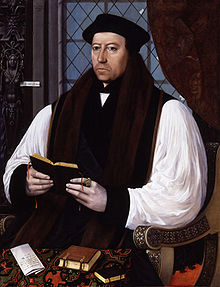An English Gospel Martyr
Today, as the attention of many is focused on the enthronement of the 105th Archbishop of Canterbury, it’s worth remembering that it‘s the 457th anniversary of the martyrdom of one of his most influential predecessors, Thomas Cranmer. Yes, 457 years ago today the leader of the English church was burnt at the stake for the sake of the gospel.
Cranmer was the archbishop who oversaw the reformation of the English church. Although Henry VIII didn’t want a Reformation in his realm, just a Catholicism he could control, he ended up giving many of the most important jobs to evangelical Protestants (those two words being synonymous back then). Henry had Cranmer enthroned as Archbishop of Canterbury. Then, after Henry’s death, with his Protestant son on the throne, Cranmer set about reforming the English church.
One of the most significant ways that Cranmer brought reformation to the English church was through his Book of Common Prayer, and, although prayerbook worship might be rather different from much of Pentecostal worship, there’s a lot we could learn from Cranmer’s prayer book. As Gregory Dix famously expressed it, Cranmer’s Order for Holy Communion was ‘the only effective attempt ever made to give liturgical expression to the doctrine of justification by faith alone’.
However, after the young King Edward VI died, the staunchly Roman Catholic Queen Mary I ascended the throne and was determined to purge England of its Reformation. So that meant Cranmer had to go. And not just out of Lambeth palace. Cranmer was to be executed as a ‘heretic’ for the gospel which he preached.
Under pain of execution, Cranmer, unlike some of the other bishops, actually recanted his supposed heresy. It wasn’t enough to get him off the hook, but it did seem a great coup for Mary. So, before his execution, Cranmer was to preach against his ‘errors’ in the University Church in ‘the other place’. The only thing was, when he got up to preach, he wouldn’t preach a false gospel, and so recanted his recantation, called upon God who saves not because of our merit but only for Christ’s sake for forgiveness, denounced the Pope ‘with all his false doctrine’, and confessed that he had signed his recantations falsely, hoping to save his life, and so as a final dramatic gesture proclaimed that the hand which had signed such lies would be burnt first (which he fulfilled at the stake, thrusting his hand into the flames).
So, today on the 457th anniversary of his martyrdom, remember an archbishop who made a huge impact in these islands for the gospel, and pray that our church leaders would faithfully stand in all circumstances for the truth of the gospel. And remember that Christ has died for all our sins, from our lying to our distrust to our unfaithfulness, as Thomas Cranmer, like Simon Peter before him, came to know.
